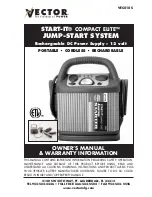
-7-
OPERATING INSTRUCTIONS
WARNINGS
• Only use this product with 12 volt lead acid batteries. Do not connect to 6 volt or 24 volt DC
batteries.
• Do not use with dry cell batteries, these batteries may burst and cause injury to a
person or damage personal property.
• Working around lead-acid batteries can be dangerous. Lead acid batteries generate
explosive gasses during charging and jump start operations.
• Stay at arms length when connecting clamps to vehicle battery. Do not face battery when
starting.
• All lead-acid batteries produce hydrogen gas, which may violently explode in the
presence of fire or sparks. Do not smoke, use matches, lighters or open flame while
near
batteries.
• Do not operate this unit or place this product near flammable materials or any location which
accumulates flammable fumes.
• Do not submerge in water.
• Some late model vehicles have on-board computers that might be damaged if the vehicle is
jump started. Always read the vehicle owners manual before attempting to jump-start the
vehicle to determine if external starting assistance is acceptable.
• Stay clear of fan blades, belts, pulleys and moving parts that can cause injury to
persons during battery jump-start.
• Do not use additional attachment other than recommended or provided by manufacturer.
• Do not exceed manufactures recommended specifications.
CAUTIONS:
• Never work alone with this product. Make sure that someone is available to give
assistance if needed.
• Wear complete eye and clothing protection. Do not touch your eyes while working near
batteries.
• Always keep the clamps in their storage compartment to prevent sparking when not
in
use.
• When using the AC or 12-volt DC charger, always remove the plug and never pull on
the the cord when disconnecting.
• Do not recharge the product with a damaged charger always replace them
immediately.
• Do not attempt to remove or replace the battery used in this device. When the battery
has reached the end of it’s useful lifetime, take the entire unit to a battery recycling
facility.
• Avoid dropping metal tools onto the vehicle battery, this can cause sparks or short
circuit the battery or other electrical parts that may lead to sparks which can cause an
explosion.
• For proper and safe operation of the 12-volt DC power accessory outlet do not insert
anything other than equipment suited for 12 volt car accessory socket.
• Do not place anything into the AC charger input socket except the provided charger
and charging lead that came supplied.
• Never charge or jump-start a frozen battery.
• Never allow clamps (positive & negative terminals) to touch together or to contact the
same piece of metal to prevent short circuits and arcing.
• Do not operate this device while wearing vinyl clothing, static electrical sparks can be
generated when vinyl clothing is rubbed.
• This product is not intended for use in the rain or temperatures above 130 deg F.
• Only use the provided charger, cables and clamps. Unauthorised parts may damage the
unit.
-6-
OPERATING INSTRUCTIONS
HOW TO JUMP START A CAR
The ENGINE STARTER provides a current up to 400 Amp (maximum) to assist with the
starting of a car when the car battery is flat.
Check to ensure the following before connecting the booster cable clamps to
the car battery:
• Ensure the ignition is off and the engine starter is fully charged.
• Ensure all ancillary equipment (lighting, radio etc.) is switched off.
• Ensure the vehicle battery is rated at 12V and is not damaged in any way.
• Ensure the battery terminals are perfectly clean, the clamps are firm and perfectly
secure.
• Remove vehicle battery filler plugs and check electrolyte level. If necessary, top up
with distilled water.
Follow the steps below to jump-start your car engine:
1. Connect the red clamp, to the positive " + " terminal of the car battery.
2. Connect the black clamp " - ", to the chassis or engine compartment well away
from the fuel lines or any moving parts, ensure the connections are secure.
3. Switch the vehicle ignition on and leave in this condition FOR APPROX FIVE
MINUTES. (This will provide the vehicle battery with a short ‘boost’ charge to allow for
easier
starting).
4. Switch the ignition to ‘start’ for no more than 6 seconds, if the engine does not start
within this time, switch off the ignition and wait for at least 3 minutes before trying
again.
5. Once the engine starts running, disconnect the black clamp " - " first and return it
to its storage position. Then disconnect the red clamp " + " from the battery
terminal and restore it to its storage position.
STORAGE & MAINTENANCE
• Protect the product from direct sunlight and other heat sources: risk of explosion of the
internal battery. Store at a temperature between 4°C and 40°C
• The technology used during the manufacture of the internal battery excludes any risk of
electrolyte gel leakage from the inside of the battery. You are nevertheless recomended
to keep the battery upright when storing it for long periods.
• Recharge the battery after every useage or every 6 to 8 weeks. Do not exceed 2
months
without
charging.
• If the low charge indicator remains red after a period of 30 hours charging the internal
battery is irrevocably damaged and cannot be recharged.
All manuals and user guides at all-guides.com























